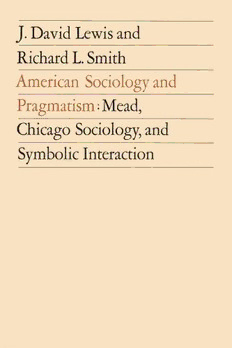
American Sociology and Pragmatism: Mead, Chicago Sociology, and Symbolic Interaction PDF
372 Pages·1980·18.526 MB·English
Most books are stored in the elastic cloud where traffic is expensive. For this reason, we have a limit on daily download.
Preview American Sociology and Pragmatism: Mead, Chicago Sociology, and Symbolic Interaction
Description:
Lewis and Smith reconstruct the intellectual histories of both American pragmatism and sociology as they developed from 1892 to 1935 at the University of Chicago. In doing so, the authors challenge much current thinking in philosophy and sociology. Contrary to the standard account of the history of American pragmatism, which depicts the philosophies of Charles Peirce, William James, John Dewey, and George Herbert Mead as forming a unified tradition, the authors argue that there were two distinct types of American pragmatism. One was the individualist pragmatism of James's and Dewey's functional psychology; the other was the more socially oriented pragmatism of Peirce and Mead.The authors present a reinterpretation of the intellectual influence of the pragmatists, especially Mead, upon the early Chicago sociologists and the subsequent tradition of symbolic interactionism. Through an analysis of relevant texts, they show that leading sociologists of the period, Small, Ellwood, Thomas, and Blumer, among others, approximate the philosophical tradition of James and Dewey more closely than that of Mead and Peirce.The convergence of textual, archival, and survey-based evidence collected by Lewis and Smith reopens the debate concerning the intellectual roots of American sociology. Their study points toward the need for a radically revised history of symbolic interactionism, American pragmatism, Chicago sociology, and American sociology itself from 1890 to 1935.
See more
The list of books you might like
Most books are stored in the elastic cloud where traffic is expensive. For this reason, we have a limit on daily download.
